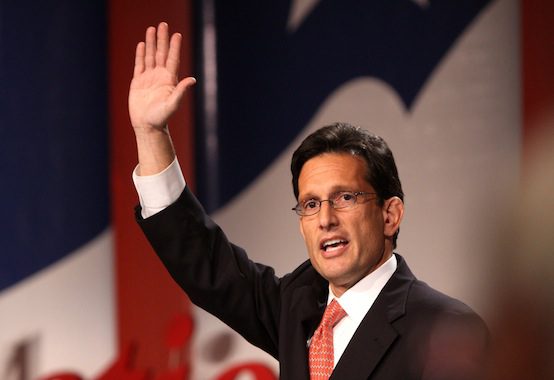Fiscal Cliff Notes: A Boehner-Cantor Split?

The House yesterday approved the Senate’s solution to the fiscal cliff. “Solution” in the loosest sense, that is: tackling difficult items such as the sequester and the debt ceiling has merely been put off. In the short term, we get a payroll tax hike, an increase on marginal income tax rates above $450,000, and — what has most scandalized the GOP right — no spending cuts.
It’s not much of a victory for either Democrats or Republicans. Although Obama gets to raise income taxes, he’s set up a situation in which Republicans may use the debt ceiling as leverage for spending cuts. Republicans hope they’ll be in a stronger position for the next round, but they really have nothing to show for this one — other than the simple fact that they’ve evaded blame for the larger tax hikes, defense cuts, and other painful measures that would have gone into effect had they not scrambled back onto the cliff.
A majority of Republicans in the House voted against the compromise, including, most notably, Majority Leader Eric Cantor and whip Kevin McCarthy. Paul Ryan voted for the agreement, as did Speaker Boehner — which is noteworthy because speakers rarely vote when they don’t have to. Has Boehner lost his colleagues’ confidence, and is Cantor angling to replace him?
I suspect the opposite is closer to the truth: the leadership team has hedged its bets, and by dividing their votes Boehner and Cantor maximize their influence. Cantor can now tell House GOP insurgents that he’s really one of them — hasn’t he just proven that? — and if even he is willing to support and follow Boehner in the future, they should too. By having Cantor and McCarthy join the dissidents, the leadership team as a whole salvages a semblance of solidarity with the House right. It’s all about appearances, just like the fiscal cliff itself.
There’s no point in getting upset about the outcome. With a GOP House, there’s a limit on how high taxes will rise. And with a Democratic Senate and president, there can’t be very significant spending cuts. My guess is that the next round will be just as full of drama as this one, only to achieve a similarly modest outcome: a few cuts to domestic and defense spending and the inevitable lift of the debt ceiling.
Keynesian orthodoxy says that tax increases are counter-stimulative, even if Keynesians do tend to think that government spending is more stimulative than private spending by wealthy individuals. The optimal Keynesian stimulus strategy isn’t tax-and-spend, it’s borrow-and-spend, which is why Paul Krugman is quick to dismiss any fearful talk of “bond vigilantes” ready to trash U.S. securities on account of out-of-control federal spending. There are other progressive rationales for tax hikes, but the dominant economic thought in the Democratic Party doesn’t consider them the highest priority. (With the unfortunate exception of the payroll tax, since that feeds directly into Social Security — or at least into the notion of Social Security as merely an egalitarian savings system, rather than a redistribution and welfare scheme.)
Republicans are similarly flexible where spending cuts are concerned: they certainly don’t want the Pentagon to go begging. Boehner and McConnell this week demonstrated just how hellbent they aren’t on spending reductions. In the next round they’ll have to throw some kind of bone to right, but they’ll make sure it has as little meat on it as possible.
Again, rather than getting upset, it’s more important to look to the long term: there’s little that can be achieved in the way of reductions in non-defense spending when Democrats have this much power. The thing to prepare for is holding the GOP’s feet to the flames the next time they really have the wherewithal to do something. Complaining about spending in the midst of a fragile economy is unpopular, and doing so while the Democrats hold the White House and Senate amounts to mere symbolism — which is why Cantor can indulge in it. The real test comes when Republicans are holding the knife. But that’s a test they’ve failed every time.
The Tea Party is meant to ensure that the next go round will be different, but the Tea Party is part of the problem. In the absence of a real opportunity to shrink government, many of its activists would settle for wrecking government — which is what failing to raise the debt ceiling and let Uncle Sam to pay (or at least charge off) his bills amounts to. A wreck was also what some were hoping the fiscal cliff would produce. But there’s nothing conservative about that, and policy-by-catastrophe is detrimental to the cause of small government in the long run. A right that the American people can trust to govern has to be a right that shrinks government when it can, not one that tries to produce a big but bankrupt government when it can’t. To imagine that bankruptcy itself will reduce the size of government where Washington is concerned is an opium dream — all it will do is lead to “regime uncertainty” followed by novel uses and abuses of power (such as the trillion-dollar coin) and a backlash against Tea Party types at the polls. Patience and good strategy would serve the cause of smaller government much better than ceilings and cliffs.
Comments